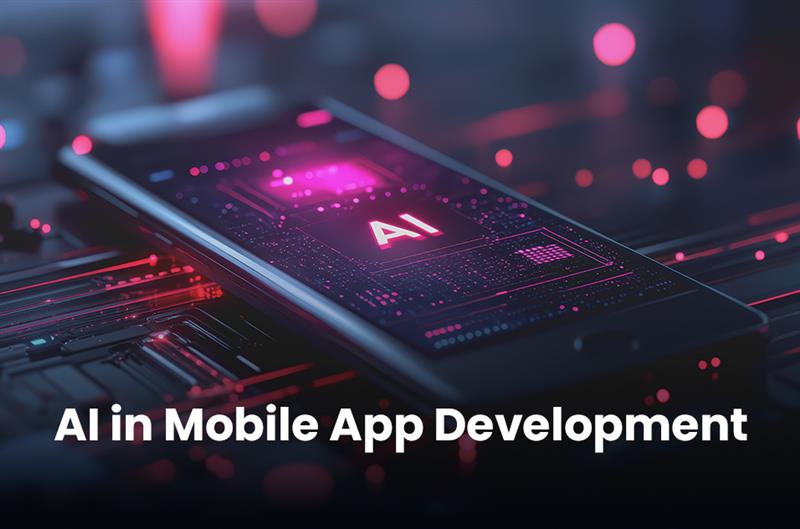
Artificial Intelligence (AI) has moved beyond theory, becoming a driving force in how we engage with technology today. In mobile app development, intelligent algorithms are driving smarter, more personalized, and more efficient applications than ever before. From predictive analytics to AI-powered chatbots, these innovations are transforming user expectations and business outcomes. Whether it’s AI in app development for Android or iOS, businesses are now leveraging machine learning, natural language processing, and automation to create seamless and engaging user experiences.
AI in mobile app development is the integration of artificial intelligence technologies like machine learning, natural language processing (NLP), and computer vision into mobile applications. This allows apps to perform tasks that normally require human intelligence, such as recognizing speech, making predictions, or personalizing recommendations.
In simple terms, AI app development enables applications to “learn” from user behavior and improve over time without explicit programming. For example, a shopping app can predict which products you might like based on your browsing history, or a fitness app can tailor workout suggestions based on your past activity patterns.
The importance of AI mobile app development has skyrocketed because user expectations are evolving. Today’s users want apps that not only function but also anticipate their needs.
Here are a few reasons why it’s vital:
As a result, companies across industries, from retail to healthcare, are adopting AI app development to stay competitive in this fast-changing digital world.
The Growth in AI mobile app development stems from two major forces: the massive growth of user-generated data and advanced AI algorithms that can process it. AI now powers apps to learn from interactions, adapt to preferences, predict needs, and automate tasks, making them smarter, faster, and more human-like.
1. Real-Time Adaptation
Apps adjust instantly to changing contexts. Like navigation apps reroute for traffic, food delivery apps update delivery times.
2. Visual Recognition & AR
Computer vision powers immersive, interactive experiences.LikeAR shopping previews, social media filters.
3. Smarter Security
“AI quickly catches fraud and keeps your information. LikePayment apps freeze suspicious transactions.
4. Accessibility & Inclusivity
AI ensures apps are usable by all. Like Speech-to-text, text-to-speech, and real-time translation.
5. Context-Aware Computing
Apps deliver relevant info based on location and activity. Like Travel apps suggest nearby attractions.
6. Continuous Learning
AI apps improve with every interaction. Like Language apps adjust difficulty dynamically.
1. Personalization at Scale
AI uses your data to make sure the app shows you what you like and need. For example, streaming apps like Netflix recommend shows based on viewing history, keeping users engaged longer.
2. Smarter Search and Recommendations
Through AI android app development, search results become more relevant. AI understands user intent, not just keywords, which improves accuracy in product searches or service queries. Like Fitness apps suggest workouts based on history, e-commerce apps show relevant products.
3. AI-Powered Chatbots and Virtual Assistants
Mobile apps now integrate chatbots that can handle customer queries 24/7. With NLP, these bots understand and respond in human-like language, improving customer satisfaction. Like Banking apps answer “What’s my last transaction?” instantly.
4. Predictive Analytics for Better Decision-Making
AI predicts future trends or user actions based on past behavior. For instance, a travel app can suggest the best time to book tickets for lower prices.
5. Voice Recognition and NLP
Voice-enabled apps like Google Assistant or Alexa use AI to understand commands and respond instantly, making interactions faster and more natural.
AI in mobile app development is revolutionizing how businesses connect with their customers by delivering smarter, faster, and more personalized experiences. Through AI app development, companies can analyze user behavior, predict preferences, and offer tailored content that boosts engagement and satisfaction.
From intelligent chatbots to predictive analytics, AI mobile app development enables apps to learn, adapt, and respond in real time, enhancing efficiency and customer loyalty. Businesses across industries are leveraging AI to streamline operations, improve decision-making, and stay ahead of competitors. This technological shift is not just an upgrade; it’s a game-changer for user experience in the business world.
Decide what AI features you recommend: voice search, chatbots, etc.
Select tools like TensorFlow, IBM Watson, or Google ML Kit for AI integration.
Add one AI feature, try it out, and expand once you know it works
Partner with developers who have experience in AI app development to ensure quality and efficiency.
Ensure AI doesn’t overcomplicate your app; keep it user-friendly.
Overloading with Features
Instead of adding too many AI tools at once, focus on what benefits the user most.
Ignoring Data Privacy
AI depends on data to ensure compliance with privacy laws like GDPR.
Lack of Continuous Learning
Update AI models often so they can keep learning and adjusting to new information.
Neglecting User Feedback
AI should enhance, not frustrate. Gather feedback and adjust accordingly.
AI in mobile app development is changing the way we use apps, from personalized content to smart chatbots, voice commands, and predictive suggestions. AI-powered apps are now giving audiences experiences that feel more Simple to navigate, responsive, and engaging. They offer personalized recommendations, provide real-time voice assistance, and adapt to user behavior on the fly, making them smarter, faster, and more user-centric than ever before.
Businesses that adopt AI mobile app development now will have a clear competitive edge in the coming years. If you’re ready to integrate AI into your next mobile app, the time to start is today because the future of mobile technology is already here.
FAQs
How is AI used in mobile apps?
AI is used in mobile apps to provide personalized recommendations, power chatbots, enable voice commands, improve image recognition, and predict user behavior for a smarter experience
Why is AI important for modern apps?
AI is important for modern apps because it makes them smarter, more personalized, and efficient—enhancing user experience, automating tasks, and helping apps predict and adapt to user needs.
How to integrate AI into an app?
AI can be integrated into an app by using AI frameworks or APIs, connecting trained models to the app, and continuously testing for accuracy and performance.
How can a mobile app benefit my business?
It helps improve customer engagement, increase brand loyalty, and boost sales.
Can a mobile app integrate with our existing business systems?
Yes, apps can connect with CRMs, ERPs, and other business software.
How do we choose the right mobile application development company?
Look for proven experience, client reviews, transparent pricing, and post-launch support.
By continuing to use the website, you agree to our Cookie Policy. To learn more about how we process your personal data, read our Privacy Policy
